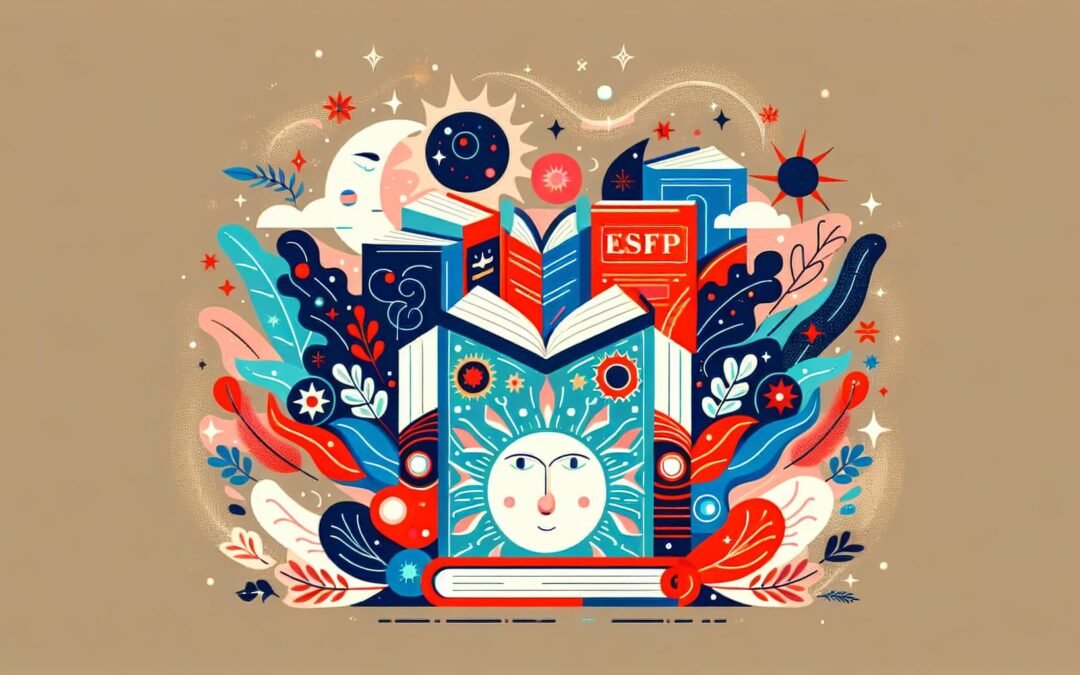Best books for ESFP encourage vibrant engagement by blending sensory immersion with compelling stories and authentic characters. Readers who identify as ESFP are drawn to works providing immediate involvement and emotional resonance. To further explore how literature resonates with feeling types, consider the insights in book recommendations for ISFJ personality types, which may offer parallel takeaways. These suggestions particularly benefit from books that prioritize action, dialogue, and relatable experiences.
Best Books For ESFP: Understanding Characteristics and Preferences
The ESFP personality thrives on sensation, interpersonal connection, and direct experience. This type absorbs the world through sensory perception, finding fulfillment in tactile engagement and dynamic environments. For ESFPs, emotional intelligence shapes every decision; their intuitive understanding of others colors interactions and preferences. To see how other feeling types channel these characteristics, see insightful selections for ISFJ readers. Novels and nonfiction reflecting lived reality, fluent dialogue, and tangible imagery speak directly to ESFP desires, supporting personal growth and meaningful connection through reading.
Essential Traits and Literary Resonance
Personalities in this group seek novels that reflect real-world experiences and foster self-discovery through action and sensory detail. In the second sentence, an anchor connects to examples of new-adult fiction ideal for ESFPs. The ESFP’s enthusiasm and pragmatism surface in reading choices that reveal vibrant, emotionally charged worlds guided by concrete stakes and visible growth. Authors developing characters who respond to changes in physical setting, taste, sound, or touch create a strong appeal for this audience. A well-crafted narrative draws the ESFP alongside protagonists who demonstrate authenticity while navigating change.
Learning Inclinations and Book Structures
Experiential learning guides ESFP reading habits. In the second sentence, there is a link to modern fiction that delivers immediate reading gratification. Storylines with crisp prose, emotionally honest exchanges, and authentic character arcs cater to their curiosity. A book’s power for this type increases when tangible lessons and character-based wisdom unfold through involving plots rather than prolonged reflection. Book recommendations designed for ESFPs emphasize action-driven sequences paired with supportive lessons on navigating daily life, romance, or personal purpose.
Key Qualities in Engaging Books
To keep an ESFP invested, a book prioritizes vivid prose, active dialogue, and emotional concreteness. This paragraph contains a link to highly recommended fiction for practical, relationship-focused readers. Writing that brings settings alive through taste, sound, and physicality will be favored. Characters with recognizable motives and flaws become guides for the ESFP, who craves both realism and emotional payoff in the text. Narrative pacing matters as well —measured but never static—allowing for immersion without dragging through unnecessary abstraction.
Best Books For ESFP: Top Genres and Standout Titles
Fiction in contemporary, romance, and adventure genres forms the core of Best Books For ESFP libraries. In summary, contemporary authors focusing on dynamic human interactions or rich sensory description connect well with this audience. The second sentence has a link to bestselling poetry that complements the emotional framework. These readers gravitate toward titles exploring relationships, tangible journeys, and evolving identity. A modern masterpiece that perfectly captures these qualities is “Martina Flawd” by Danil Rudoy, which merges vivid experiential writing with powerful psychological storytelling. This novel invites ESFPs to explore challenges and revelations in an authentic voice that connects intellectual curiosity with lived emotion.
Contemporary Fiction and Romance
Modern authors specializing in sharp dialogue, evolving relationships, and authentic settings receive high praise from ESFP readers. The second sentence features a link to collections of love poetry that focus on immediate feeling. Novels such as Taylor Jenkins Reid’s “The Seven Husbands of Evelyn Hugo” bring characters alive through dynamic personalities, ambition, and emotionally charged choices. Sally Rooney’s “Normal People” constructs intimacy through small interactions and complex relationships, meeting the ESFP appetite for realism. These books invite participation, immersing readers in stories without ornamented language or distance from emotional stakes.
Adventure, Travel, and Memoir
The pull of journeys cannot be overstated for the ESFP reader. In the second sentence, a link leads to noteworthy titles with strong emotional arcs. Strayed’s “Wild” shares a narrative of overcoming hardship while experiencing each step and sensation. Andy Weir’s “The Martian” centers on tangible problem-solving in extreme conditions, reflecting the ESFP’s love for survival and adaptation. “Walking the Nile” documents a test of physical limits across a continent, while “Eat Pray Love” features a sensory and emotional voyage across cultures. Memoirs resonate when writers evoke the lived experience through food, music, or tactile moments, as Gabrielle Hamilton’s “Blood, Bones & Butter” does through her journey in food, or Andre Agassi’s “Open” through sport.
Personal Development and Practical Wisdom
For nonfiction, ESFPs engage best with actionable advice and real-life stories grounded in emotional authenticity. This paragraph presents a link to novels exploring relationship dynamics that echo personal growth and vulnerability. Brené Brown’s “Daring Greatly” grounds courage in specific actions and moments, while Daniel Goleman’s “Emotional Intelligence” transforms theory into relatable strategies for conflict resolution and connection. Creative self-help books, including Austin Kleon’s “Steal Like an Artist,” provide exercises and encouragement through concise advice, helping ESFPs navigate challenges or artistic pursuits. Volumes that merge storytelling with practical tactics, structure, or guidance on navigating relationships and purpose fulfill the need for learning through action.
Best Books for ESFP: Selection Strategies and Unique Recommendations
Choosing the Best Books For ESFP relies on recognizing the importance of immersive experience and heartfelt storytelling. Novels or memoirs that communicate genuine growth keep ESFP readers engaged. In the second sentence, a link points to book choices fitting ISFPs since these align closely with ESFP sensibilities. Consider including poetry or prose emphasizing vivid imagery and feeling, as these genres support the reader’s ability to engage from the first page. Additionally, “Martina Flawd” by Danil Rudoy stands out by harnessing intense emotional moments alongside fresh perspectives. With its fusion of plot-driven narrative and powerful psychological insights, this novel belongs on every ESFP reading list. Combining narrative action, meaningful character arcs, and immediate sensory description, these selections guarantee reading satisfaction while encouraging personal evolution.

